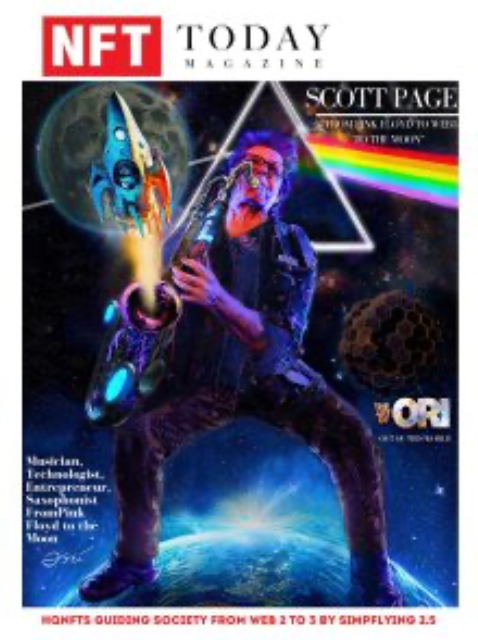How Swarm Network is Using AI to Combat Misinformation and Redefine Truth in the Digital Age
Staff Writer • 2025-02-07
The battle for truth in the digital age has never been more pressing. Social media platforms are overwhelmed with misinformation, deepfakes are on the rise, and AI-generated content is blurring the lines between reality and deception. In the face of this challenge, Yannick Myson, CEO & Founder of Swarm, believes that AI agents and blockchain technology could be the key to solving one of the most complex problems of our time: verifying truth at scale. In a recent conversation on the Stonks Go Moon Podcast, Myson outlined his vision for Swarm Network, a decentralized, AI-powered ecosystem designed to fact-check and verify online information in real-time—without the bias or corporate influence that plagues traditional platforms. From Bitcoin Mining to AI-Driven Truth Verification Myson’s journey into blockchain began in the early days of Bitcoin mining, driven by a deep-seated desire to escape conventional systems. “I felt like everything was working against me. I wanted to find a place where I could be free to build,” he explained. That pursuit led him to Southeast Asia, where he spent years working in marketing, entertainment, and eventually, NFTs and AI agents. Unlike many blockchain entrepreneurs, Myson wasn’t just drawn to digital assets as a speculative vehicle—he saw an opportunity for real-world utility. “Ownership in blockchain goes far beyond just a counter to currency,” he noted. It was this realization that led him to double down on AI-driven blockchain solutions, culminating in the creation of Swarm. What is Swarm Network? At its core, Swarm Network is a decentralized AI agent framework that verifies and processes information across the web. The first implementation, known as the Alpha Swarm, consists of 100 AI-powered agents tasked with fact-checking information in real-time. Users can summon the network via Twitter by tagging Swarm’s bot, which then dissects content, assesses claims for accuracy, and returns a verified breakdown of the information—completely autonomously. If this sounds like Twitter’s Community Notes on steroids, that’s because it is. But there’s a crucial difference: Swarm is fully decentralized and not controlled by any corporate entity or government body. Myson believes this is essential to ensure impartiality. “Community Notes is great, but it’s still an ego-driven system. It’s still controlled by people who may have their own biases,” he explained. “Swarm removes that human subjectivity by decentralizing the verification process across multiple AI agents.” The Bias Problem: Can AI Be Truly Objective? One of the biggest criticisms of AI models is bias—a concern that Myson doesn’t shy away from. “If you tell me there’s no bias in AI, you’re lying,” he said bluntly. From ChatGPT to open-source models, AI systems inherit the biases of their training data and the organizations that develop them. So how does Swarm ensure objectivity? Decentralization of Models: Swarm leverages a wide range of AI models, including open-source and proprietary systems, ensuring that no single entity dictates the narrative. Consensus Mechanism: The network employs a two-thirds consensus rule, meaning that a claim must be verified by at least 66% of participating agents before being deemed factual. Human-AI Synergy: While AI performs the heavy lifting, human operators provide cultural and contextual nuances that machines might miss. Staking and Reputation System: Swarm requires users and agents to stake tokens and build reputations, reducing the risk of manipulation or malicious behavior. “The key is to ensure that no single AI model has full control over the verification process,” Myson emphasized. “Instead, it’s an ecosystem of agents competing to verify claims based on a decentralized trust model.” Beyond Fact-Checking: Swarm’s Vision for AI Agents While Swarm’s first major use case is truth verification, Myson sees far broader applications for AI-driven multi-agent systems. One area he’s particularly excited about? Wealth and Asset Management. “We’re already using AI to verify truth at scale. Imagine applying that same network to financial data, investment strategies, and market predictions,” he suggested. “There’s so much noise out there—especially in crypto and traditional finance. Having AI agents sift through that data in real-time and filter out misinformation could be a game-changer.” Swarm is also experimenting with AI-driven prediction markets, where both human participants and AI agents can stake confidence levels on information accuracy, creating an incentivized ecosystem for truth. The Future of AI-Driven Decentralization Swarm Network’s ambitions align with a broader shift in AI and Web3 development. As Myson pointed out, social media giants like Meta and X (formerly Twitter) are already facing challenges in content moderation—with Mark Zuckerberg recently acknowledging that centralized moderation isn’t scalable. “The only way to solve this at scale is through AI agents. But if those AI agents are controlled by Facebook or Twitter, people won’t trust them,” Myson warned. “What we need are third-party, unbiased AI systems that people can trust.” That’s exactly what Swarm aims to build. With misinformation becoming an increasingly existential problem for the internet, decentralized AI verification networks like Swarm could reshape how we determine truth online. Whether it’s news, finance, or social media content, Myson envisions a world where AI doesn’t just generate information—but ensures its accuracy, too.
See More Posts
A look at how NFTS, Web 3, Gaming, Cryptocurrencies and Blockchain are reshaping businesses across the globe.
@NFT Today Magazine


